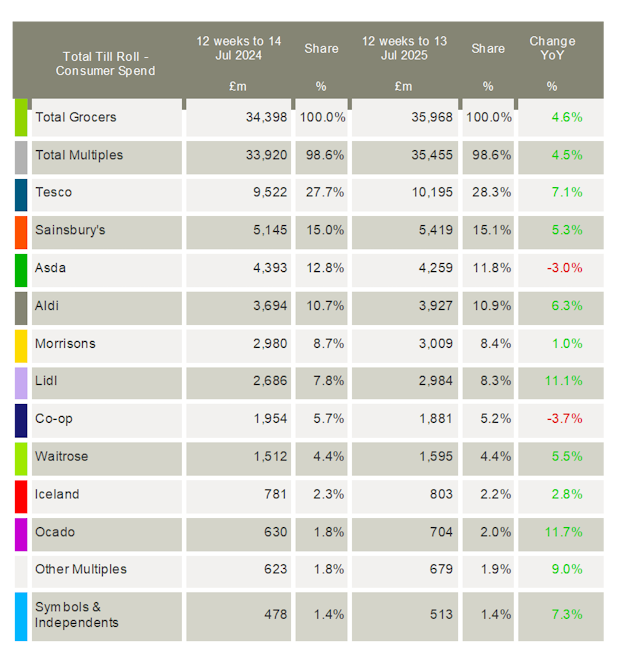Latest figures from Worldpanel by Numerator show take home sales at UK grocers grew by 5.4% in the four weeks to 13 July compared with last year, driven by accelerating price inflation, which hit its highest level since January 2024 at 5.2%. With the average household spending £5,283 each year at supermarkets, the research group noted that the latest rise could add £275 to people’s grocery bills if their shopping habits stay the same.
A recent survey by Worldpanel found that just under two-thirds of households are very concerned about the cost of their grocery shopping, and people are adapting their habits to avoid the full impact of price rises.
Fraser McKevitt, the group’s head of retail and consumer insight, commented: “Own label products, which are often cheaper, continue to be some of the big winners and, in fact, sales of these ranges are again outpacing brands, growing by 5.6% versus 4.9%. These inflationary worries aren’t just changing what we buy, but how we prepare it too. We often see people choosing to make simpler meals when they are trying to save money, and today, almost seven in ten dinner plates include fewer than six components.”
With budgets under pressure, supermarkets have been finding new ways to pique the interest of consumers. McKevitt said: “Innovation is absolutely vital to help grocers keep up with new trends and make sure they’re meeting shoppers’ needs as behaviours and priorities shift. The drinks aisle in particular seems to be offering up plenty of inspiration. Iced coffee has soared in popularity in recent years, and with summer temperatures rising, sales were up this month by 81%. Kombucha drinks have also burst onto the scene, with sales more than doubling over the latest four weeks compared with 2024. No and low alcohol drinks continue their gradual march into the mainstream too, with nearly seven in every 100 households buying a product this month, pushing sales up by 21%.”
Looking at the performance of individual retailers, Lidl reached a record high market share this period at 8.3%, gaining 0.5 percentage points as it attracted more than half a million new customers to its stores. Aldi grew by 6.3%, bringing its share up to 10.9%.
Tesco also boosted its share to 28.3% after sales grew by 7.1%, the fastest rate since December 2023. Sales at Sainsbury’s increased by 5.3%, raising its market share to 15.1%.
Matching its previous share high of 2.0%, Ocado was again the fastest-growing grocer in the UK. Its sales rose by 11.7%, exceeding the overall online market growth rate of 5.7%. Over the past 12 weeks, online accounted for 12.0% of all sales at the grocers, with 23% of households making at least one virtual shopping trip. Meanwhile, grocery sales at M&S were 6.5% higher than a year ago.
Spending through the tills at Morrisons nudged up just 1.0%, with its market share falling to 8.4%. Despite its turnaround efforts, Asda’s share of the market slipped to 11.8% after a 3.0% fall in sales.

NAM Implications:
- Consumers are patently being affected by the 5.2% inflation ‘peak’ (and more to come)…
- …in terms of more savvy food spending and eating carefully to conserve cash.
- Temporary moves (like brand to own label equivalents)…
- …may prove difficult/expensive for suppliers to reverse.
- Innovation in some categories may help.
- Lidl continues to find top of mind for retailers and suppliers (raising questions re their role in trade strategies?)
- Meanwhile, the discounters’ joint share of 19.2%…
- …if not raising concerns, should be.
- By the same token, the falling shares of Morrisons and Asda cast a shadow…



